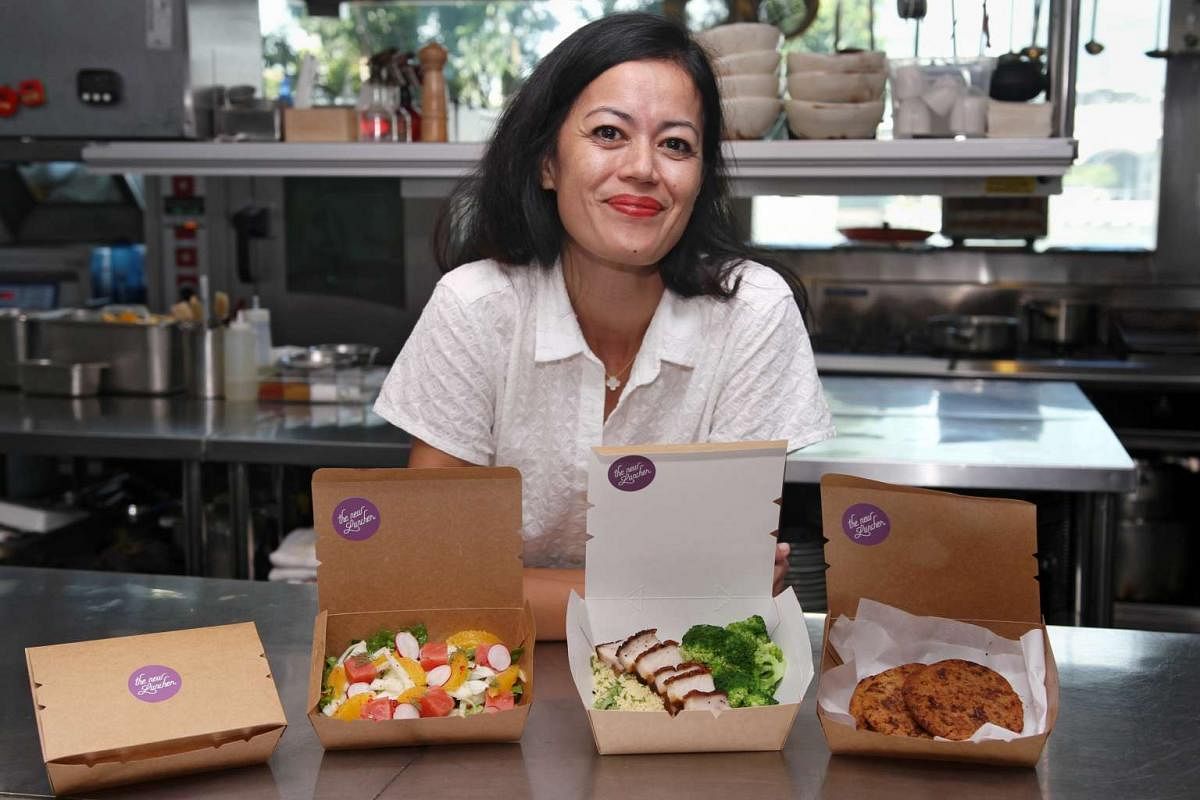Meal delivery services for kids
Food delivery companies are offering healthy, affordable and gourmet meal options for children

In the past month, eight-year-old Gaspard has been having lunches in school that sound as if they have been plucked right off the menu of a fine-dining restaurant.
A typical lunch could comprise red miso skirt steak with turnip, scallion, and brown rice cake, or a soba noodle salad, or a croque monsieur.
If it sounds delicious, that is because Gaspard's lunches are created, cooked and prepared by chef Emmanuel Stroobant, 49, and his team of chefs.
Stroobant is the chef-owner of fine-dining French restaurant Saint Pierre at One Fullerton and manages several other food-and-beverage brands under the Emmanuel Stroobant Group with his wife.
Lest you think such a lunch for your child will come at a hefty price, it does not.
The New Luncher's meals are priced below $10 a meal, including delivery fees. A Little Luncher for children aged four to eight is $7.90, while a Big Luncher for children aged nine and older costs $8.90.
Launched last month, The New Luncher bills itself as Asia's first online lunchbox service for school children and is the brainchild of expatriate Catherine Lesselin, 42, a French citizen of French and Vietnamese heritage.
It is the newest player in the scene of food delivery companies that have sprung up here in recent years.
Some of them - The New Luncher, Petit Bowl and the Young Women's Christian Association's Meals-On-Wheels for Children programme - cater specifically to children, while food-delivery platforms such as Deliveroo, UberEATS and foodpanda supply their meals to both adults and kids.
The New Luncher was started by Mrs Lesselin, who came to Singapore in 2011 with her husband. He works here as the co-founder of a financial company. The couple have two sons aged 11 and eight.
She started the service after reading up on nutrition and was horrified to learn that her children would have a shorter lifespan if they ate food that had pesticides and growth hormones injected into them.
"That's what health experts say, but I believe we can change that," she says. "I want to feed children well and give them access to good food."
In June last year, she decided to discontinue womenswear line Lespard, which she had co-founded, to concentrate on bringing her lunchbox idea to life.
Between June and November last year, she spoke to parents, doctors and health experts to see if there was demand for such a service and asked them how they would want it to work.
The conversations showed her she had hit on a need, but the problem was - who would cook the meals?
In November, after lunch at Saint Pierre, she decided to pitch her business idea to chef Stroobant. Back then, she did not know him and it was her first time dining in his restaurant. She says: "He sat down, listened to me and said 'yes' in 15 minutes. I could not believe it. He made The New Luncher possible."
Chef Stroobant says he agreed to partner Mrs Lesselin because her mission resounded with his "own goal to inculcate healthy eating habits in the younger generation".
"Through The New Luncher, I am able to better educate the younger generation on the importance of healthy eating," says the father of two daughters aged four and seven.
He and Mrs Lesselin co-founded the company with a six-figure sum that comprises their savings as well as the investments of some friends and fellow food-conscious parents.
Within a month of launching the service, they already have more than 100 parents subscribing to the meals for their children. She is also in talks with about 20 schools to deliver the meals to the students there.
The meals are cooked from scratch daily, packed and then delivered to schools in time for lunch. There are three meal options - Western, Asian and Vegetarian - and the menu changes every day. Any repetition comes at least two months later and there are new recipes every month.
Mrs Lesselin says: "My sons tell me these are the best lunches they have ever had. I've parents telling me they are so happy their kids are finishing their lunches."
Targeting a younger age group and smaller age range is homegrown outfit Petit Bowl, which began in 2009 as a cafe serving food made specially for babies to children aged six years old.
In 2011, its founder Josephine Koh, 40, invested about $20,000 in e-commerce infrastructure after Petit Bowl moved out of its mall space.
The preservative-free, frozen meals can now be ordered online and prices start at $5. There is no minimum order, but delivery fees apply.
Deliveries are done islandwide, save for Pulau Ubin, military areas, Sentosa and Jurong Island.
For families who want to dine in without cooking, food-delivery platforms Deliveroo, UberEATS and foodpanda offer restaurant partners who are able to supply meals to both adults and kids.
UberEATS has about 100 restaurant partners offering kids' meal options; Deliveroo has 20 to 25; and foodpanda has about 30. Prices of a kid's meal option begin at $3.
An UberEATS spokesman says: "With the selection available on UberEATS, parents no longer have to just rely on having pizzas, burgers, nuggets or fish fingers delivered to feed their children."
Mr Aloysius Pek, 32, who works in an interior design firm, agrees that food-delivery platforms have made dining-in a breeze for his family.
He and his wife have a four- month-old daughter and a three-year old son, and they order pasta or zi char from restaurants on foodpanda at least once a week. "It's convenient and my son looks forward to these meals," he says.
For families with lesser means, the Young Women's Christian Association (YWCA) offers a meal delivery service for those aged between five and 12 from low-income families.
Its Meals-On-Wheels for Children programme currently provides for about 150 such children by delivering free, nutritious halal dinners to their homes and schools.
The programme began in 2007 after it was reported in the newspapers that many children from lowincome families went to bed hungry.
Ms Gladys Foo, YWCA Singapore's senior manager of programmes and services, says the programme began with about 70 children and grew to support more than 450 children in 2015. But the figure has since dropped to 150 after some schools pulled out of the programme. "Schools have limited resources and are unable to manage the administrative work involved to distribute and monitor the lunch packs," she says.
But the need for this service remains.
Ms Foo says the YWCA often receives requests from schools and parents to deliver meals beyond their service boundaries (currently limited to western Singapore), but are unable to support these due to limited resources - in the form of delivery vans and drivers - on their end.
"We need more donations to defray the cost of expansion," she says. "We would like to reach out to more families because nutritious food is especially important for children in their foundational years."
Join ST's Telegram channel and get the latest breaking news delivered to you.
A version of this article appeared in the print edition of The Sunday Times on June 18, 2017, with the headline Meal delivery services for kids. Subscribe

